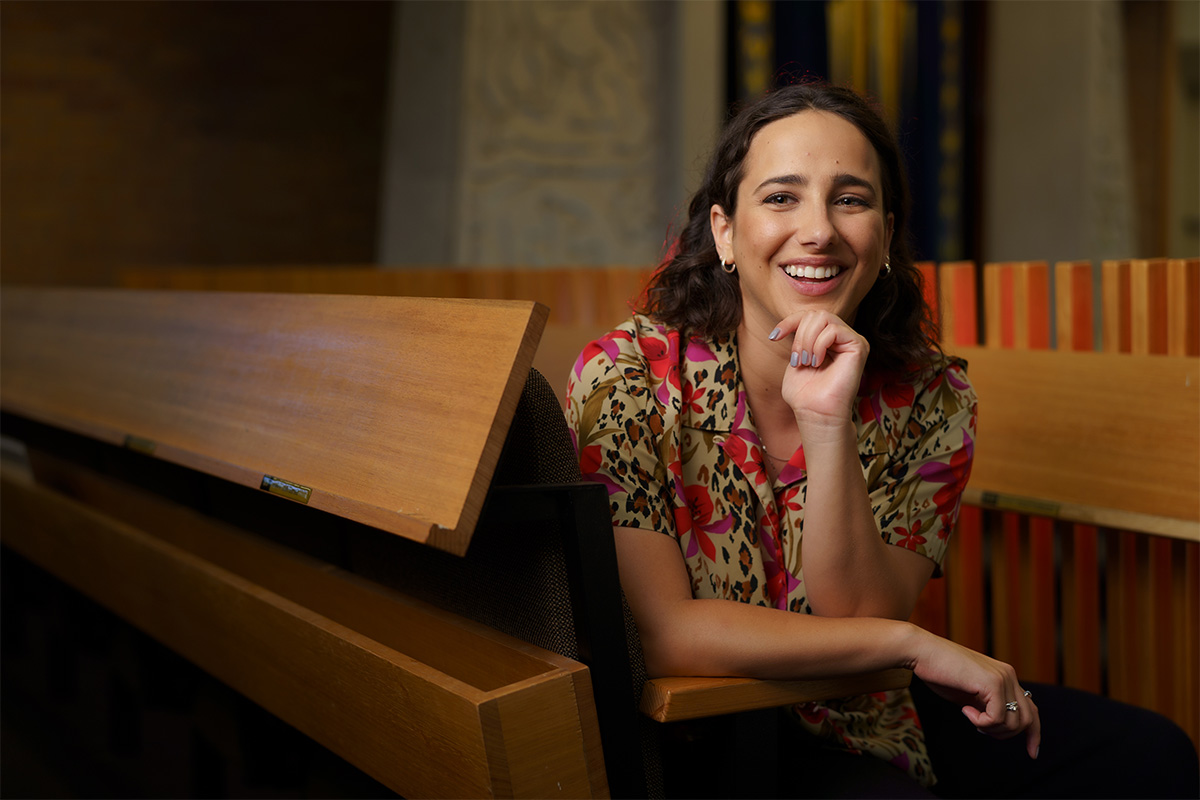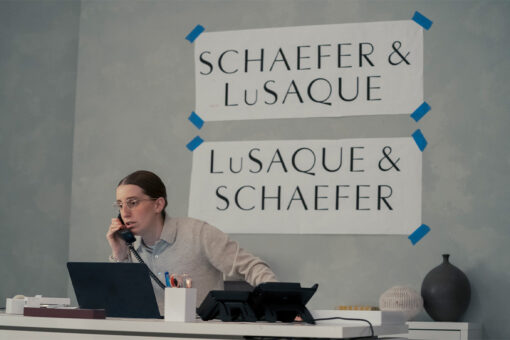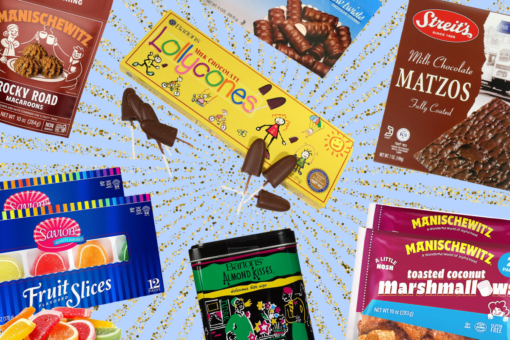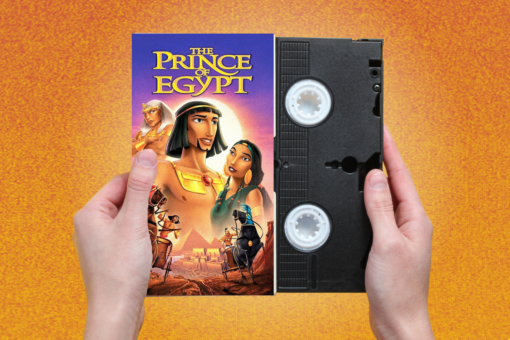From about bat mitzvah age, Jewish Kiwi TV writer Simone Nathan knew she would have a special relationship with her Jewish identity.
Nathan, a self-described “very anxious, dorky kid who didn’t like being put on display,” had anticipated having a run-of-the-mill Modern Orthodox Jewish coming-of-age ceremony. Instead, her mother decided that Simone would put on an all-female service and reading of the Megillat Esther on Purim.
“In my head at the time, I was like, the one thing that’s good about being a young Jewish woman is that I don’t have to read from the Torah… at my bat mitzvah,” Simone told me over Zoom recently. “It was like she put together this gig that I was headlining.”
She hilariously went on, “It was the most bizarre day because everybody was dressed up for Purim. So I’m about to perform for my bat mitzvah and I’m looking around my community and everyone is wearing the most insane costumes. Even the rabbi, who was, like, the tallest man in the world, was dressed as a camel. And then, after the service, we went into the shul with my whole community, and he presented me with my first siddur. And I remember looking up into the mouth of the camel, where his face was, and he was like, ‘Mazel tov, Simone!’ Like how is my relationship with Judaism ever going to be normal after that moment?!”
Fast forward a few decades and the unusual relationship between Simone and Judaism has only continued — except now it’s televised.
On May 26, “Kid Sister,” a TV show Simone wrote, produced and starred in, debuted in New Zealand. It is the country’s first show created by and about a Jewish Kiwi.
Very loosely based on her life, the five-episode comedy series tells the story of Lulu Emmanuel (Nathan), a woman from a Modern Orthodox family in New Zealand. While Lulu is content with her non-Jewish boyfriend Ollie (played by her real-life boyfriend Paul Williams), her family is absolutely insistent she marry within the culture. The intense pressure Lulu feels from her family is then only further complicated when she discovers that she’s pregnant.
Despite my best efforts (and believe me, I’ve tried!!), I’ve only been able to watch episodes one and two — “Kid Sister” is currently only streaming on New Zealand-based TVNZ. Even so, from what I’ve seen of the show, it’s really special. Nathan, whose writing credits include the overwhelmingly popular “Our Flag Means Death” starring Taika Waititi, has created a show that feels deeply, authentically Jewish in a way I’ve never seen before. Sans overdone jokes and stereotypes, “Kid Sister” is fresh; equally important, it’s laugh-out-loud funny.
I chatted with Simone about everything “Kid Sister” (including why the show’s creative team followed Hey Alma on social media), the beauty of being Jewish in New Zealand and naturally, Jewish pirates.
This conversation has been lightly edited and condensed for clarity.
So first of all, I wanted to say that I got to see the first two episodes of “Kid Sister” and I loved them. And now I’m eagerly waiting to see the rest of the series.
Thank you so much.
But before I get into that, you were a writer on “Our Flag Means Death,” which was executive produced by another Jewish New Zealander, Taika Waititi. I have to ask, what was that like? And how involved was Taika?
So how I got the job wasn’t actually through New Zealand stuff, it was because I’d been in the states for so long trying to be a TV writer. For context, I moved to the states in 2014 to study creative writing — actually it’s called a Masters of Dramatic Writing — at NYU. And then after I graduated, I worked as an assistant on “Bloodline” and as an assistant on “Inside Amy Schumer,” and then got a job at Nickelodeon doing this writing fellowship. But then my visa ran out and I had to move home, which I was gutted about. After a year, I won the green card lottery, moved back and basically worked on a couple more shows until I wrote a script that got me agents and managers. The first job that my agent put me forward for was “Our Flag Means Death.” The head writer of the show David Jenkins liked my samples and they happen to both perfectly align with “Our Flag Means Death.”
So I worked on that for a couple of months, and I wrote episode six, “The Art of Fuckery.” And oh my God, the response to it has been so amazing. I’ve really enjoyed seeing all the art on Twitter and all of the fans. But I’ve been watching it all from New Zealand and having massive FOMO.
So to answer your question, Taika came in to shoot and direct an episode when the writers’ room had finished. But all Kiwis know each other in some way. And so, I do know Taika but not well, you know? We all know each other from around. It’s kind of like Jews, right? It’s like we’re all connected in some way.
Yeah, for sure. Could you tell me about your Jewish upbringing and identity?
So my mom’s side of the family are South African-Russian Jews and my dad’s family moved to New Zealand in 1840. We’re of Moroccan-French-Portuguese heritage on my dad’s side, so they were Sephardic. They moved to the country when it was being colonized, so they were among the first Jewish families there, and my family had the first Jewish marriage in New Zealand, first Jewish burial, first bris, all that crazy shit. Then my great-great-great-whatever grandpa had a minyan tent on the beach, and he started the Jewish community in Auckland. And then a member of that line has been the president of the community since then. We have a very tight-knit Modern Orthodox community, the Auckland Hebrew Congregation, where we actually were able to film for “Kid Sister.” And then there’s also a Reform community, Beth Shalom.
I went to a pretty posh, private all-girls school that was Presbyterian — the only Jewish school only went up to bar/bat mitzvah age — and I was always getting into trouble and called into the principal’s office for refusing to go to chapel. In hindsight, it was pretty disrespectful.
But anyway, I was raised in a kosher home and attended synagogue. And I was just super into it. I went to B’nei Akiva, which is one of the two youth groups here. But as you can see in the show, in New Zealand, your Jewish friends are like your siblings. Then you’re kind of expected to marry them. And it’s like, no, I’ve known them since we were babies. And in my family, it was kind of a big deal to marry someone Jewish. But I never dated Jews. I was always just dating non-Jews. It was chronic. It was always going to be such a problem, so I was like, well, I might as well write about it.
And I’ll also add that I think the New Zealand brand of Judaism is really special, especially having lived overseas. In New Zealand, you don’t take being Jewish for granted because you have to fight really hard to stay unassimilated and practicing, in whatever form that is, and whatever practicing means to you. I can’t really speak for everyone, but for me, it was a very non-judgmental Jewish upbringing where all types of Judaism and levels of practice were accepted and celebrated, and it was very focused on the cultural aspects of Judaism. Plus, the Jewish community in Auckland has this beautiful site that’s in the middle of the city. It’s a thriving space that’s very safe and secure and beautiful.
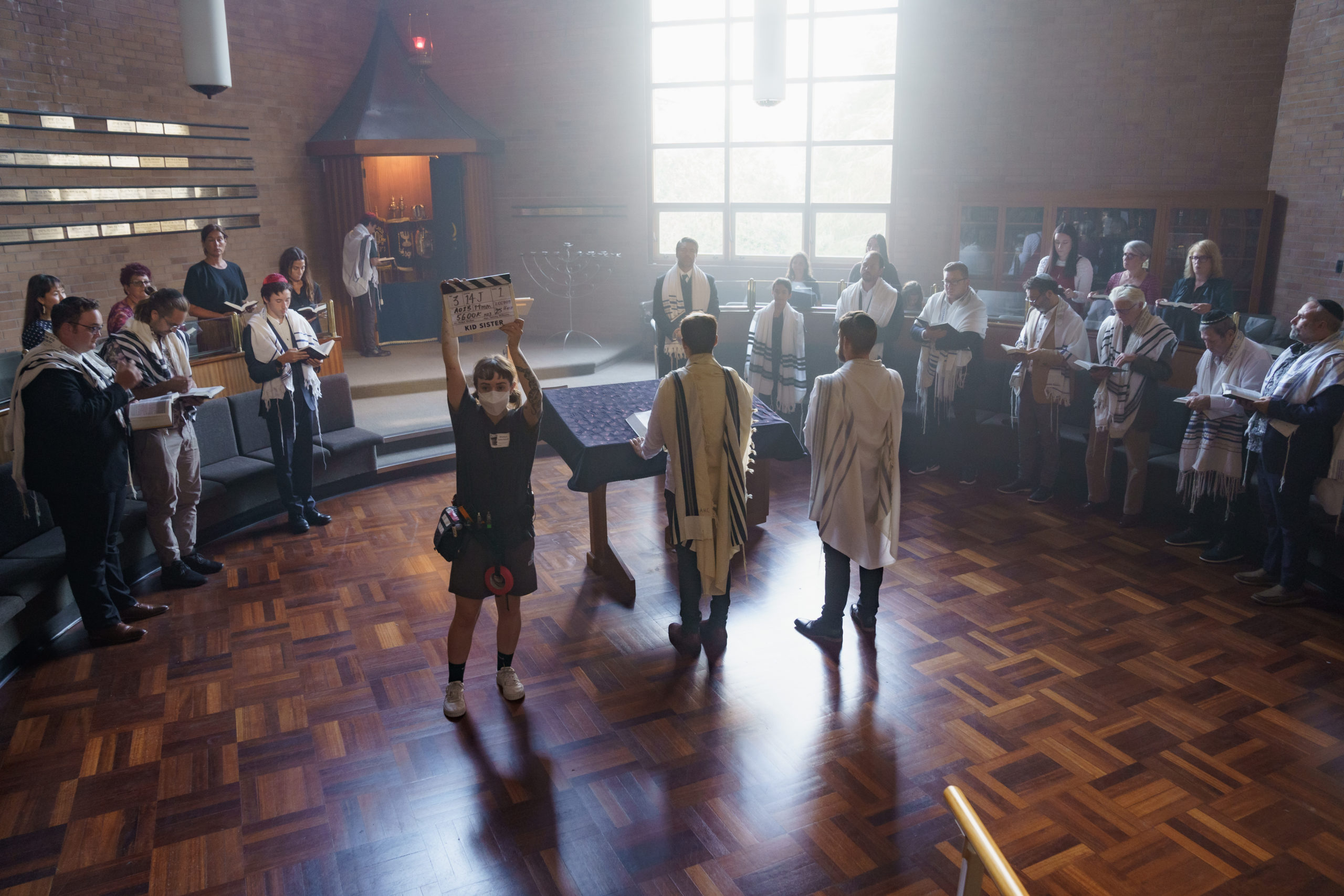
That’s wonderful. Do you still identify as Modern Orthodox? And does that practice play a role in your day-to-day life?
Yeah, I don’t know… So I spent a year in Israel, and I went on a very religious program. And for me, it kind of had the opposite effect that it should have had. I walked away with way more questions about the country itself and the stories that we were being told about who we are. But also, religiously, I’d kind of peaked. So when I moved to study in Australia, and then I moved to the States, one of the things that was really exciting to me is that I was meeting a lot of Jews, but not on purpose.
When I was at NYU, I saw very different brands of Judaism, where a lot of people had never set foot in a synagogue and weren’t bar or bat mitzvahed, but felt very Jewish and had their own really liberated political beliefs and religious beliefs. I was like, oh, cool! I don’t have to practice it this one way. And I really enjoyed trying the smorgasbord of different synagogues in New York and just seeing where I fit in. So I don’t think I have a good answer as to what type of Jew I identify as.
However, my boyfriend Paul, who plays my boyfriend in the show, is converting to Orthodox Judaism right now. And we’re having to really immerse ourselves in Modern Orthodoxy in a way that I haven’t for a really long time. Suddenly we’re keeping kosher again, and we’re keeping Shabbat and going to synagogue all the time and meeting a lot of other Modern Orthodox couples who are at our synagogue or in our conversion classes. I am reconnecting with the same Judaism that I practiced as a child, and I’m actually finding it to be really enjoyable. Australia’s Jewish community is much bigger, and so there’s, like, a lot of kosher meat here. And there’s a small, really nice, walkable Jewish community here. So yeah, this is a new experience that’s being opened up to me at the moment that I’m finding really interesting.
That sounds really exciting. It’s also interesting to see the parallel in the show where Ollie’s like, “I can convert! I can get Jewish!”
Yes, exactly. If we get to do another season of the show, the conversion process is definitely something we’ll explore. And it’s interesting how much we both have to be involved in the process: I go to every class and every synagogue service that he goes to, it’s not just him. But even so, I do feel that it’s his story to tell. We just get asked such bold questions about it from people;I have to talk about it all the time. And I do feel kind of nervous talking about it, as you can tell.
More generally, I’ve been nervous about putting “Kid Sister” out there because I don’t want to be the one representative of all things Jewish in New Zealand. So many types of Jewish identity exist and are valid, and I would hate for anybody to watch the show and feel like I was representing an experience that wasn’t theirs.
In America, I think there is that luxury of knowing that you can make one Jewish show that is part of a huge tapestry of other shows. I hope people can look at “Kid Sister” as a part of that larger tapestry and not its own thing.
So, how did “Kid Sister” come to be? And what was that writing process like?
So basically, it was Thanksgiving in 2016. Thanksgiving was always such a lonely time in the States for me, because I’d often get invited places, and I’d go and I’d feel like an outsider. I just felt like I was intruding on a family’s yearly get-together. So after a couple years of this I was like, I’m not doing this anymore. People would invite me and I’d be like, thank you, I’ve got plans! And then my plan was that I would stay in my flat and give my cat a turkey wet food for her dinner, and then I would just write over that weekend.
And one year, I wrote “Kid Sister,” but it was set in Boston. I didn’t really know any Boston Jews, except some family there. But because I’d been living in the States for a while, I was writing most of my scripts to be set in America. I thought that that was how you got something made. The story worked and I got really good feedback on it, but I couldn’t get anything to happen with it.
And then I came back to New Zealand for a visit. And I had a meeting with this company Greenstone and Harriet Crampton, who would become co-executive producers [on the show]. I showed “Kid Sister” to her and she was like, “Why don’t you set this in New Zealand? This is almost your story and then you set it somewhere that you don’t know anything about.” And I was like, OK, drag me to hell. And she was like, “Rewrite it in a Kiwi setting and let’s see if that works.” And then I did and it did.
So we applied for funding and we didn’t get it and then we waited a year and we reapplied and we got it. So I spent all of last year, which was full of intense, policed lockdowns in New Zealand, writing. I wrote five episodes and that was about all I had in me.
I think it’s amazing that it was just you writing the show, because in the US, TV is written by a room full of writers. Was it exhausting writing this show all on your own?
Part of what I love about working in this industry in the States is that it’s extremely collaborative. I would have loved to have had the ability to hire more people and perspectives and other Jews, and have people who can actually look at your dialogue and say, “hey, this is problematic,” or “this doesn’t feel right.” Having more people who can check you a little bit is nice. But also, when does a woman get an opportunity to make her own show and have an all-female team on this show? I’ve never worked with more women in my life.
But I’d say it was definitely a big responsibility being the only Jewish person on the creative team. Tamar, who is the head of PR and press, is also Jewish. And because she’s from Auckland, she was the Jewish consultant on the show and did all the liaising with the community because we wanted to film there. We needed people to check that the practices looked correct and that we were doing the right brachot (blessings) and songs and all that stuff. And they were amazing.
But still, they come to you with a bucket of rocks at the funeral scene and say, which of these rocks looks like the rock that you would use to put on the grave? And you’re like, I don’t remember! I don’t know! And they’re like, which of these Magen David plaques looks right to put on the grave? And that was why it was so good that I involved my family so much in the production. My dad isn’t an actor, but he played my uncle. My little brother played my brother and then the sister-in-law character, Bec the American, is Jewish, and the rabbi is Jewish, and the doctor is Jewish. We basically found every Jew that we could and employed them, so that I didn’t have to carry that on my own.
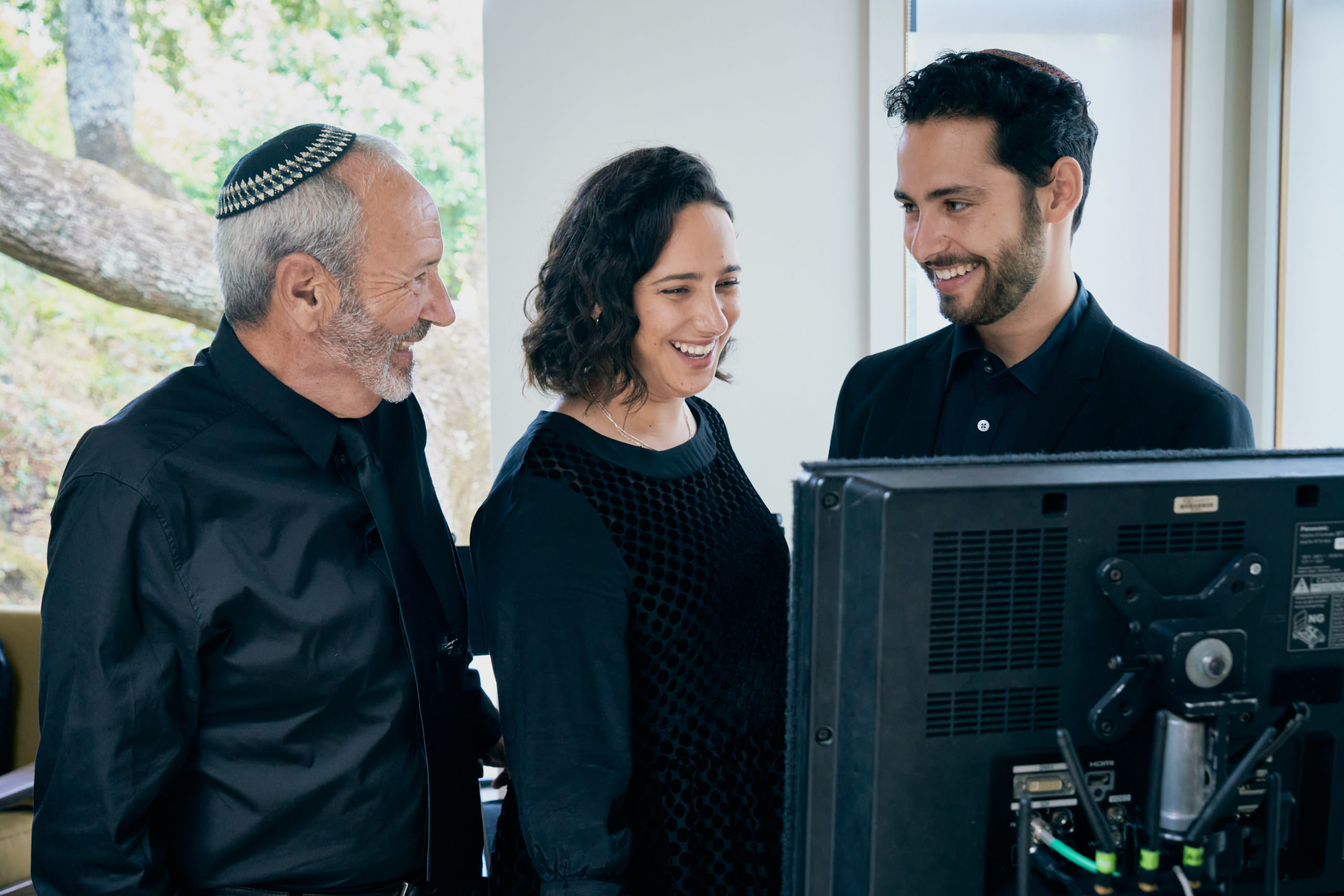
That’s great. So you told me that you asked everyone on the creative team to follow Hey Alma on social media to educate themselves about Jewishness. Which, first of all, is amazing. But also, was there anything else that you had the creative team do to teach them about Judaism?
I made a watch list of things that I thought would be helpful. It’s kind of funny, actually. It was like “Fiddler on the Roof,” “Broad City,” “The Nanny,” “Sex and the City” — I found a clip that put together all of Charlotte’s conversion moments — “The O.C.” … even Schmidt in “New Girl” is such a good example of somebody who we never see practicing Judaism, but it’s such a big part of his character, weirdly. You get his Jewishness in his dialogue and his choice of words and little moments.
But yeah, getting them to follow Hey Alma was really important, because it’s a page that celebrates what’s great about being Jewish, but also discusses what is complicated and what [Jews] need to improve on and doesn’t just show a perfect view of worldwide Judaism.
I definitely appreciated that aspect of “Kid Sister.” It’s really important to show certain dynamics in Jewish culture that aren’t great, for example not accepting non-Jewish partners. Obviously I also loved how the show displays the joyous and funny parts of Jewish culture, but including the unsavory parts too makes it that much more authentic.
I was very anxious all the way through creating this about what the Auckland Jewish community’s response was going to be. Because there were older members of the community, and specifically one older person, who had heard about the show and was really worried about it. I think they didn’t like the idea of having Jewish practices up against modern, kind of racy materials. So in the opening scene, Lulu is discussing sex with her ex-boyfriend and how he would take his kippah off. And, at the same time, we’re seeing a funeral and they’re saying kaddish. And I think to that person, that is like the ultimate disrespectful take on Judaism. And that’s a generational difference that ultimately I just can’t fix or account for.
That was such a great way to start the show, and truly one of my favorite jokes in the first two episodes. I’ve seen a lot of press about how “Kid Sister” is the first show in New Zealand written by and about Jewish Kiwis. What do you want Jewish Kiwis to get out of watching the show?
Just the amount of supportive messages that I’ve received from Jewish Kiwis — a lot of whom I know and a lot of whom I don’t know, from small towns where I didn’t know Jewish people exist, and immigrants or just unaffiliated Jews — who are just like, man, I never expected to see myself represented this directly. That’s huge. I think that’s so fun. I hope that they got a laugh out of it. I really just hope that they found it funny, and that they saw something of themselves or their family or their community in it.
But also, I’m kind of not making the show for Kiwi Jews, because there aren’t that many of us. As I’ve said, “Kid Sister” is a love letter to New Zealand Jews, but I think it has another, maybe more important mission, which is that I want non-Jewish New Zealanders to see that Jews are exactly like them and have the same problems. I would be so excited if somebody from another culture watched it and said, I’m glad that we’re not the only ones who go through this. And hopefully then people can maybe just talk about it a little bit more, because I think it is a little bit traumatic to have those expectations on you. And I understand that there’s a reason why families have those expectations – it’s because they’re actually trying to keep alive a culture that is really threatened in New Zealand, and getting absorbed by the larger, more pervasive white, English, Christian culture.
It was a big guiding star for me to not feel like I needed to explain Jewish practices, either. I give the audience context, but ultimately they’ll figure it out. They can Google it if they don’t know what’s going on. And I think having to get an understanding from watching the show is much more interesting anyway, and trusts the intelligence of your audience.
That reminds me of when I interviewed comic Alex Edelman. He told me about having to describe Sukkot to someone who is not Jewish and how ridiculous the whole interaction was.
Oh my God, that does kind of encapsulate how so much of Judaism is that we do it because we do it. And I did want to have that in the show, that sometimes Jews don’t really know why we’re doing stuff. And that’s OK, too.
Has your family seen the show? Have they told you their thoughts on it?
Yes, totally. I’m very lucky because I didn’t get any negative feedback. I think they really like having the mickey taken out of them. But it is also a little tough, because I think people who watch will assume that my family said all the things to me that the characters said. Some of the time they totally did, and some of the time they really didn’t. So that’s the one thing they were a bit “eh” about.
I don’t know, there’s nothing better than making your grandma proud of you. And my grandma is really proud of the show. She really enjoyed the show and I was worried that, because she’s older, maybe she’d be like, oh, I don’t want to hear about this. But I think we need to have more faith in our older viewers. Actually, a lot of the positive responses that I’ve gotten have been from older members of the community who are excited about having a fresh portrayal of Judaism on screen.
With the show, I wanted to explore how someone’s relationship with Judaism can change their entire life, and that it can be a lifelong journey. I really want to track that journey with Lulu, who identifies as a cultural Jew. As she moves forward, if the characters undergo the conversion process, how will that impact her self-described cultural Jew-ness? I really want “Kid Sister” to be a show about somebody coming back to their religion — or at least finding their place within the religion. Because I think women in Modern Orthodox communities have to do a lot of labor in terms of figuring out where their feminism and where their ethics fit in with the prescribed roles of women in that community. And I think that journey can be really interesting and fruitful.
I would love to see that. Do you have any sense of whether you’ll get a season two? Are you planning for it at all?
Yeah, we will start a mini-room for it tomorrow. We’ve gotten a little bit of funding from TVNZ to develop an outline for another season. And then we’ll apply for funding to see if New Zealand On-Air, who make all of those decisions, will fund another season. But I’m pretty hopeful. I have so many ideas for future seasons and so many things that I want to explore about this family and the story.
With your future projects, do you think you’ll include your Jewishness in the same way? And what drove you to incorporate your Jewishness into this project?
I’ve never thought of that before… I remember in the room for “Our Flag Means Death” I kept trying to pitch Jewish pirates.
Oh my God, that’s amazing.
I’ve done so much research on pirates in general, and I’ve found really interesting storylines about Jewish pirates, and I kept being like, and what if this guy was Jewish?! And everyone was like…. No. Nothing ever quite worked for season one. But I think I kept pushing for it because I’m really excited by original, and surprising presentations of Judaism.
But here’s what I’ll say: I do not want to ever write something this autobiographical, again. Even if “Kid Sister” isn’t exactly true to my story, it’s still way more personal than I would have liked. And I much prefer hiding behind different characters and storylines. And I’m also not an actor, so I don’t really know if I plan to do more acting. One of the main reasons why I did want to act in this is because it was so important to me to have a Jewish person playing a Jewish role for the lead. It was like, please, can we do that? And then, it was also like, if I couldn’t stand up and do it myself, why should I ask somebody else to do it?
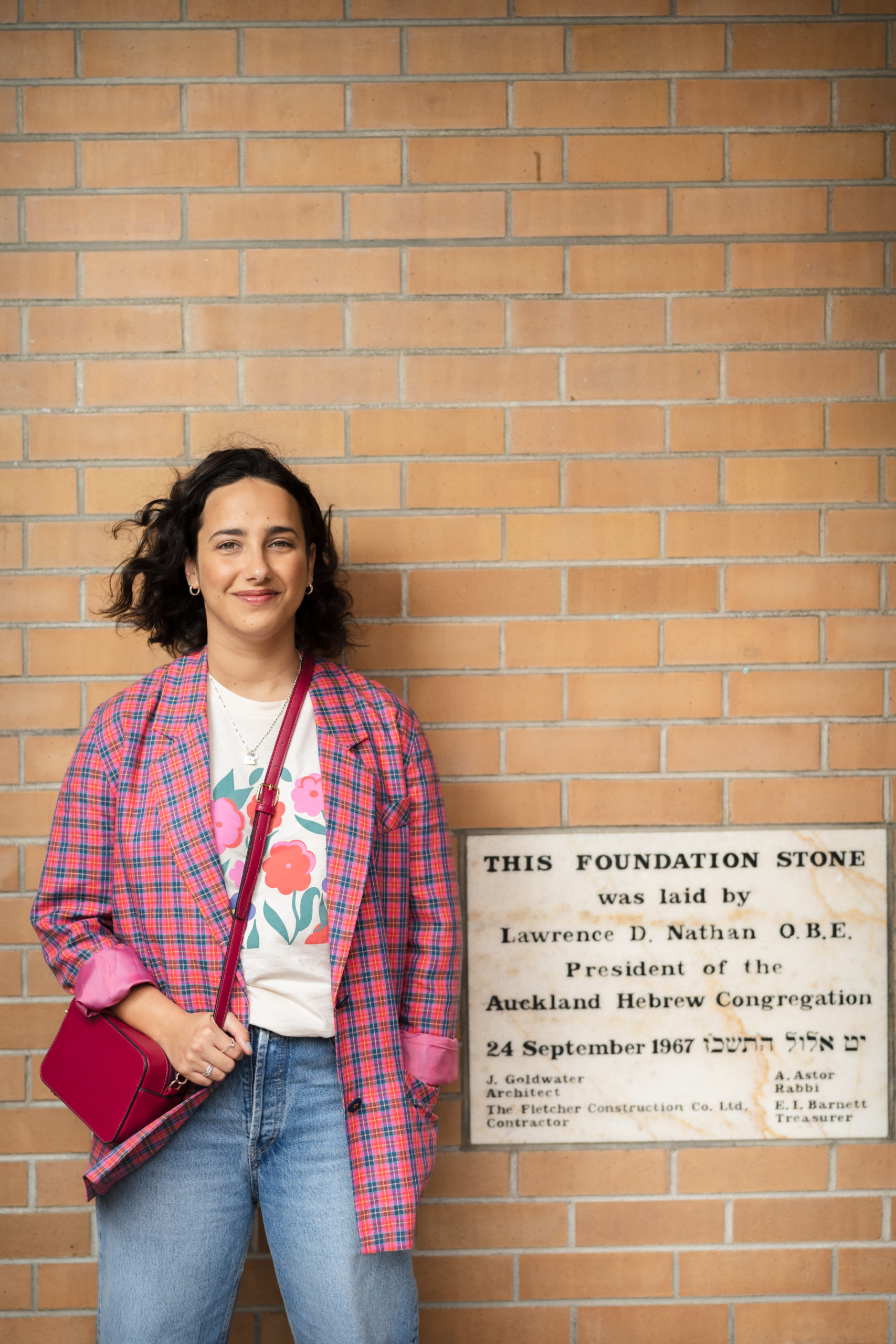
I’ve heard from other non-American Jews that so much of Jewish media is through an American Jewish lens. Is there anything you’d want international Jews or American Jews to understand about the specific Jewish Kiwi experience?
There aren’t that many synagogues to choose from in New Zealand. The fact that there really is one Modern Orthodox community in Auckland means that you’re kind of stuck with each other. It’s like that joke: a Jew is left on a desert island. And when they come back to get him, he’s built two synagogues. And they’re like, why did you build two? And he’s like, because this is the one I go to and this is the one I would never step foot in. In Auckland, you literally either go to one or the other. I wish it weren’t so divided, but it is.
And right now, the Auckland Hebrew Congregation doesn’t even have a rabbi. Our rabbi left for Australia because he wanted his kids to go to Jewish schools. Often it can be really hard to get a minyan at shul. Usually we do, but sometimes we don’t. But I think that sometimes your culture can taste sweeter when you have to fight for it a little bit, and when you can’t take it for granted. And in New Zealand, you can go to synagogue on a Saturday, and then go on a beautiful hike or go sailing and be in what I think is the most beautiful country in the world. So, I mean, that’s not objective. That’s my feeling because it’s my culture. But I’m grateful for both the advantages and the disadvantages combined. I’m very proud to be a Kiwi Jew.
“Kid Sister” is currently only available to stream on TVNZ OnDemand.
